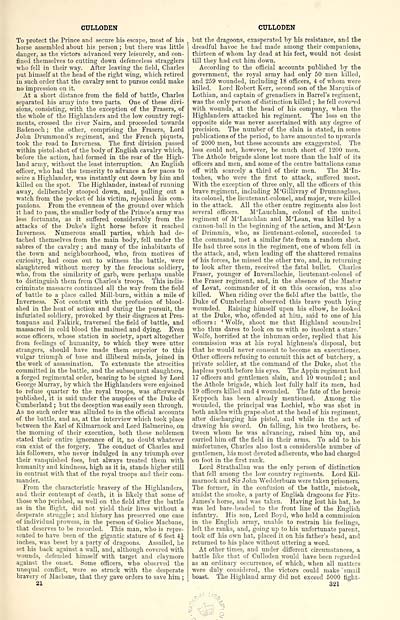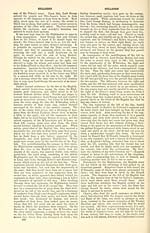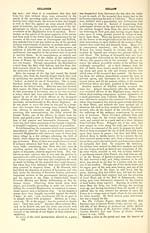Ordnance gazetteer of Scotland > Volume 2
(67) Page 321
Download files
Complete book:
Individual page:
Thumbnail gallery: Grid view | List view

CULLODEN
To protect the Prince and secure his escape, most of his
horse assembled about his person ; but there was little
danger, as the victors advanced very leisurely, and con-
fined themselves to cutting down defenceless stragglers
who fell in their way. After leaving the field, Charles
put himself at the head of the right wing, which retired
in such order that the cavalry sent to pursue could make
no impression on it.
At a short distance from the field of battle, Charles
separated his army into two parts. One of these divi-
sions, consisting, with the exception of the Frasers, of
the whole of the Highlanders and the low country regi-
ments, crossed the river Nairn, and proceeded towards
Badenoch ; the other, comprising the Frasers, Lord
John Drummond's regiment, and the French piquets,
took the road to Inverness. The first division passed
within pistol-shot of the body of English cavalry which,
before the action, had formed in the rear of the High-
land army, without the least interruption. An English
officer, who had the temerity to advance a few paces to
seize a Highlander, was instantly cut down by him and
killed on the spot. The Highlander, instead of running
away, deliberately stooped down, and, pulling out a
watch from the pocket of his victim, rejoined his com-
panions. From the evenness of the ground over which
it had to pass, the smaller body of the Prince's army was
less fortunate, as it suffered considerably from the
attacks of the Duke's light horse before it reached
Inverness. Numerous small parties, which had de-
tached themselves from the main body, fell under the
sabres of the cavalry ; and many of the inhabitants of
the town and neighbourhood, who, from motives of
curiosity, had come out to witness the battle, were
slaughtered without mercy by the ferocious soldiery,
who, from the similarity of garb, were perhaps unable
to distinguish them from Charles's troops. This indis-
criminate massacre continued all the way from the field
of battle to a place called Mill-burn, within a mile of
Inverness. Not content with the profusion of blood-
shed in the heat of action and during the pursuit, the
infuriated soldiery, provoked by their disgraces at Pres-
tonpans and Falkirk, traversed the field of battle, and
massacred in cold blood the maimed and dying. Even
some officers, whose station in society, apart altogether
from feelings of humanity, to which they were utter
strangers, should have made them superior to this
vulgar triumph of base and illiberal minds, joined in
the work of assassination. To extenuate the atrocities
committed in the battle, and the subsequent slaughters,
a forged regimental order, bearing to be signed by Lord
George Murray, by which the Highlanders were enjoined
to refuse quarter to the royal troops, was afterwards
published, it is said under the auspices of the Duke of
Cumberland ; but the deception was easily seen through.
As no such order was alluded to in the official accounts
of the battle, and as, at the interview which took place
between the Earl of Kilmarnock and Lord Balmerino, on
the morning of their execution, both these noblemen
stated their entire ignorance of it, no doubt whatever
can exist of the forgery. The conduct of Charles and
his followers, who never indulged in any triumph over
their vanquished foes, but always treated them with
humanity and kindness, high as it is, stands higher still
in contrast with that of the royal troops and their com-
mander.
From the characteristic bravery of the Highlanders,
and their contempt of death, it is likely that some of
those who perished, as well on the field after the battle
as in the flight, did not yield their lives without a
desperate struggle ; and history has preserved one case
of individual prowess, in the person of Golice Macbane,
that deserves to be recorded. This man, who is repre-
sented to have been of the gigantic stature of 6 feet 4J
inches, was beset by a party of dragoons. Assailed, he
set his back against a wall, and, although covered with
wounds, defended himself with target and claymore
against the onset. Some officers, who observed the
unequal conflict, were so struck with the desperate
bravery of Macbane, that they gave orders to save him ;
21
CULLODEN
but the dragoons, exasperated by his resistance, and the
dreadful havoc he had made among their companions,
thirteen of whom lay dead at his feet, would not desist
till they had cut him down.
According to the official accounts published by the
government, the royal army had only 50 men killed,
and 259 wounded, including 18 officers, i of whom were
killed. Lord Robert Kerr, second son of the Marquis of
Lothian, and captain of grenadiers in Barrel's regiment,
was the only person of distinction killed ; he fell covered
with wounds, at the head of his company, when the
Highlanders attacked his regiment. The loss on the
opposite side was never ascertained with any degree of
precision. The number of the slain is stated, in some
publications of the period, to have amounted to upwards
of 2000 men, but these accounts are exaggerated. The
loss could not, however, be much short of 1200 men.
The Athole brigade alone lost more than the half of its
officers and men, and some of the centre battalions came
off with scarcely a third of their men. The MTn-
toshes, who were the first to attack, suffered most.
With the exception of three only, all the officers of this
brave regiment, including M'Gillivray of Drumnaglass,
its colonel, the lieutenant-colonel, and major, were killed
in the attack. All the other centre regiments also lost
several officers. M'Lauchlan, colonel of the united
regiment of M'Lauchlan and M'Lean, was killed by a
cannon-ball in the beginning of the action, and M'Lean
of Drimmin, who, as lieutenant-colonel, succeeded to
the command, met a similar fate from a random shot.
He had three sons in the regiment, one of whom fell in
the attack, and, when leading off the shattered remains
of his forces, he missed the other two, and, in returning
to look after them, received the fatal bullet. Charles
Fraser, younger of Inverallochie, lieutenant-colonel of
the Fraser regiment, and, in the absence of the Master
of Lovat, commander of it on this occasion, was also
killed. When riding over the field after the battle, the
Duke of Cumberland observed this brave youth lying
wounded. Eaising himself upon his elbow, he looked
at the Duke, who, offended at him, said to one of his
officers : ' Wolfe, shoot me that Highland scoundrel
who thus dares to look on us with so insolent a stare. '
Wolfe, horrified at the inhuman order, replied that his
commission was at his royal highness's disposal, but
that he would never consent to become an executioner.
Other officers refusing to commit this act of butchery, a
private soldier, at the command of the Duke, shot the
hapless youth before his eyes. The Appin regiment had
17 officers and gentlemen slain, and 10 wounded ; and
the Athole brigade, which lost fully half its men, had
19 officers killed and 4 wounded. The fate of the heroic
Keppoch has been already mentioned. Among the
wounded, the principal was Lochiel, who was shot in
both ankles with grape-shot at the head of his regiment,
after discharging his pistol, and while in the act of
drawing his sword. On falling, his two brothers, be-
tween whom he was advancing, raised him up, and
carried him off the field in their arms. To add to his
misfortunes, Charles also lost a considerable number of
gentlemen, his most devoted adherents, who had charged
on foot in the first rank.
Lord Strathallan was the only person of distinction
that fell among the low country regiments. Lord Kil-
marnock and Sir John Wedderburn were taken prisoners.
The former, in the confusion of the battle, mistook,
amidst the smoke, a party of English dragoons for Fitz-
James's horse, and was taken. Having lost his hat, he
was led bare-headed to the front line of the English
infantry. His son, Lord Boyd, who held a commission
in the English army, unable to restrain his feelings,
left the ranks, and, going up to his unfortunate parent,
took off bis own hat, placed it on his father's head, and
returned to his place without uttering a word.
At other times, and under different circumstances, a
battle like that of Culloden would have been regarded
as an ordinary occurrence, of which, when all matters
were duly considered, the victors could make 'small
boast. The Highland army did not exceed 5000 iight-
321
\
To protect the Prince and secure his escape, most of his
horse assembled about his person ; but there was little
danger, as the victors advanced very leisurely, and con-
fined themselves to cutting down defenceless stragglers
who fell in their way. After leaving the field, Charles
put himself at the head of the right wing, which retired
in such order that the cavalry sent to pursue could make
no impression on it.
At a short distance from the field of battle, Charles
separated his army into two parts. One of these divi-
sions, consisting, with the exception of the Frasers, of
the whole of the Highlanders and the low country regi-
ments, crossed the river Nairn, and proceeded towards
Badenoch ; the other, comprising the Frasers, Lord
John Drummond's regiment, and the French piquets,
took the road to Inverness. The first division passed
within pistol-shot of the body of English cavalry which,
before the action, had formed in the rear of the High-
land army, without the least interruption. An English
officer, who had the temerity to advance a few paces to
seize a Highlander, was instantly cut down by him and
killed on the spot. The Highlander, instead of running
away, deliberately stooped down, and, pulling out a
watch from the pocket of his victim, rejoined his com-
panions. From the evenness of the ground over which
it had to pass, the smaller body of the Prince's army was
less fortunate, as it suffered considerably from the
attacks of the Duke's light horse before it reached
Inverness. Numerous small parties, which had de-
tached themselves from the main body, fell under the
sabres of the cavalry ; and many of the inhabitants of
the town and neighbourhood, who, from motives of
curiosity, had come out to witness the battle, were
slaughtered without mercy by the ferocious soldiery,
who, from the similarity of garb, were perhaps unable
to distinguish them from Charles's troops. This indis-
criminate massacre continued all the way from the field
of battle to a place called Mill-burn, within a mile of
Inverness. Not content with the profusion of blood-
shed in the heat of action and during the pursuit, the
infuriated soldiery, provoked by their disgraces at Pres-
tonpans and Falkirk, traversed the field of battle, and
massacred in cold blood the maimed and dying. Even
some officers, whose station in society, apart altogether
from feelings of humanity, to which they were utter
strangers, should have made them superior to this
vulgar triumph of base and illiberal minds, joined in
the work of assassination. To extenuate the atrocities
committed in the battle, and the subsequent slaughters,
a forged regimental order, bearing to be signed by Lord
George Murray, by which the Highlanders were enjoined
to refuse quarter to the royal troops, was afterwards
published, it is said under the auspices of the Duke of
Cumberland ; but the deception was easily seen through.
As no such order was alluded to in the official accounts
of the battle, and as, at the interview which took place
between the Earl of Kilmarnock and Lord Balmerino, on
the morning of their execution, both these noblemen
stated their entire ignorance of it, no doubt whatever
can exist of the forgery. The conduct of Charles and
his followers, who never indulged in any triumph over
their vanquished foes, but always treated them with
humanity and kindness, high as it is, stands higher still
in contrast with that of the royal troops and their com-
mander.
From the characteristic bravery of the Highlanders,
and their contempt of death, it is likely that some of
those who perished, as well on the field after the battle
as in the flight, did not yield their lives without a
desperate struggle ; and history has preserved one case
of individual prowess, in the person of Golice Macbane,
that deserves to be recorded. This man, who is repre-
sented to have been of the gigantic stature of 6 feet 4J
inches, was beset by a party of dragoons. Assailed, he
set his back against a wall, and, although covered with
wounds, defended himself with target and claymore
against the onset. Some officers, who observed the
unequal conflict, were so struck with the desperate
bravery of Macbane, that they gave orders to save him ;
21
CULLODEN
but the dragoons, exasperated by his resistance, and the
dreadful havoc he had made among their companions,
thirteen of whom lay dead at his feet, would not desist
till they had cut him down.
According to the official accounts published by the
government, the royal army had only 50 men killed,
and 259 wounded, including 18 officers, i of whom were
killed. Lord Robert Kerr, second son of the Marquis of
Lothian, and captain of grenadiers in Barrel's regiment,
was the only person of distinction killed ; he fell covered
with wounds, at the head of his company, when the
Highlanders attacked his regiment. The loss on the
opposite side was never ascertained with any degree of
precision. The number of the slain is stated, in some
publications of the period, to have amounted to upwards
of 2000 men, but these accounts are exaggerated. The
loss could not, however, be much short of 1200 men.
The Athole brigade alone lost more than the half of its
officers and men, and some of the centre battalions came
off with scarcely a third of their men. The MTn-
toshes, who were the first to attack, suffered most.
With the exception of three only, all the officers of this
brave regiment, including M'Gillivray of Drumnaglass,
its colonel, the lieutenant-colonel, and major, were killed
in the attack. All the other centre regiments also lost
several officers. M'Lauchlan, colonel of the united
regiment of M'Lauchlan and M'Lean, was killed by a
cannon-ball in the beginning of the action, and M'Lean
of Drimmin, who, as lieutenant-colonel, succeeded to
the command, met a similar fate from a random shot.
He had three sons in the regiment, one of whom fell in
the attack, and, when leading off the shattered remains
of his forces, he missed the other two, and, in returning
to look after them, received the fatal bullet. Charles
Fraser, younger of Inverallochie, lieutenant-colonel of
the Fraser regiment, and, in the absence of the Master
of Lovat, commander of it on this occasion, was also
killed. When riding over the field after the battle, the
Duke of Cumberland observed this brave youth lying
wounded. Eaising himself upon his elbow, he looked
at the Duke, who, offended at him, said to one of his
officers : ' Wolfe, shoot me that Highland scoundrel
who thus dares to look on us with so insolent a stare. '
Wolfe, horrified at the inhuman order, replied that his
commission was at his royal highness's disposal, but
that he would never consent to become an executioner.
Other officers refusing to commit this act of butchery, a
private soldier, at the command of the Duke, shot the
hapless youth before his eyes. The Appin regiment had
17 officers and gentlemen slain, and 10 wounded ; and
the Athole brigade, which lost fully half its men, had
19 officers killed and 4 wounded. The fate of the heroic
Keppoch has been already mentioned. Among the
wounded, the principal was Lochiel, who was shot in
both ankles with grape-shot at the head of his regiment,
after discharging his pistol, and while in the act of
drawing his sword. On falling, his two brothers, be-
tween whom he was advancing, raised him up, and
carried him off the field in their arms. To add to his
misfortunes, Charles also lost a considerable number of
gentlemen, his most devoted adherents, who had charged
on foot in the first rank.
Lord Strathallan was the only person of distinction
that fell among the low country regiments. Lord Kil-
marnock and Sir John Wedderburn were taken prisoners.
The former, in the confusion of the battle, mistook,
amidst the smoke, a party of English dragoons for Fitz-
James's horse, and was taken. Having lost his hat, he
was led bare-headed to the front line of the English
infantry. His son, Lord Boyd, who held a commission
in the English army, unable to restrain his feelings,
left the ranks, and, going up to his unfortunate parent,
took off bis own hat, placed it on his father's head, and
returned to his place without uttering a word.
At other times, and under different circumstances, a
battle like that of Culloden would have been regarded
as an ordinary occurrence, of which, when all matters
were duly considered, the victors could make 'small
boast. The Highland army did not exceed 5000 iight-
321
\
Set display mode to: Large image | Transcription
Images and transcriptions on this page, including medium image downloads, may be used under the Creative Commons Attribution 4.0 International Licence unless otherwise stated. ![]()
| Gazetteers of Scotland, 1803-1901 > Ordnance gazetteer of Scotland > Volume 2 > (67) Page 321 |
|---|
| Permanent URL | https://digital.nls.uk/97373582 |
|---|
| Attribution and copyright: |
|
|---|---|

